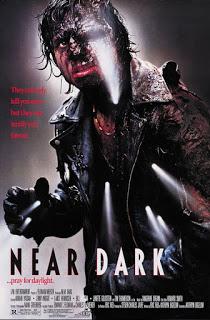
Directed By: Kathryn Bigelow
Starring: Adrian Pasdar, Jenny Wright, Lance Henriksen
Tag line: "Vampires can only kill you once, but they can terrify you forever"
Trivia: Both Johnny Depp and D.B. Sweeney auditioned for the role of Caleb
Directed by Kathryn Bigelow, Near Dark is a horror / western that, along with its unique love story, features some of the most interesting vampires ever to grace the big screen.
Caleb Cotton (Adrian Pasdar) had no idea what he was getting into when he asked Mae (Jenny Wright) out on a date. That’s because Mae is more than just a pretty face: she’s a vampire, and when she puts the bite on Caleb, he, too, is transformed into an undead creature of the night. Taken in, albeit reluctantly, by Mae’s “family”, which includes its patriarch Jesse (Lance Henriksen), his main squeeze Diamondback (Jenette Goldstein), the overly-aggressive Severen (Bill Paxton), and the adolescent Homer (Joshua John Miller), Caleb must learn the sometimes brutal truth that, in order to survive, he has to kill. Alas, it’s a lesson that doesn’t come easy to him, threatening both his standing in the group and, ultimately his very life.
Of all the classic monsters, the vampire is far and away the most romantic, often relying on his or her powers of seduction to lure in their prey. Yet the central relationship that drives the story in Near Dark has a different feel to it; never once do we sense that Mae viewed Caleb as just another meal. In fact, their early scenes together could have easily been lifted from one of the era’s many teen romances (the two spend the entire evening together, driving in Caleb’s truck and talking). Mae doesn’t even try to conceal her true nature in these early scenes; as the two are staring up at the night sky, she tells Caleb (who has no idea she’s a vampire at this point) that the light leaving the stars at that exact moment will take billions of years to reach the earth, and, unlike every other girl Caleb has ever known, she’ll still be around when it finally arrives. Later on, after Caleb has been “turned”, their relationship changes, yet at the same time becomes more intense: Because he’s having difficulties adjusting to the reality of his condition (that he must kill to survive), Mae allows Caleb to drink her blood instead (scenes that they give off a definite sexual vibe).
As for Mae’s “family”, they’re a direct contrast to her in almost every way. Led by Jesse, they are a coarse, abrasive bunch of nomads traveling from one Midwestern town to the next, leaving a trail of dead bodies in their wake. Needless to say, they don’t welcome Caleb with open arms: Severen threatens to kill the new arrival on the spot, and even young Homer is none too happy to have him around (Homer has a crush on Mae, and is plenty pissed that she’s focused her attentions elsewhere). We never do learn much about the backstories of these aggressive creatures of the night (when asked by Caleb how old he is, Jesse avoids giving a direct answer, saying only that he was once a soldier in the Confederate Army). And while we do spend a little “one-on-one” time with each of them (in a brief scene, Homer, to lure in his prey, lies in the street, making it look as if he was injured while riding his bike), it’s when they’re together that things really get crazy (the movie’s most brutal sequence sees them paying a visit to a roadside bar, where things get out of hand pretty quickly). Near Dark also makes great use of its sparse western setting and the minimalistic yet effective musical score composed by Tangerine Dream, but it’s this unique cast of characters that makes it so unforgettable.
With Near Dark, director Bigelow tells a touching love story while, at the same time, taking what was traditionally a gothic creature and stripping it to its most basic elements (feeding at night, avoiding the sun by day), and in so doing, has given the cinematic world a truly intriguing vampire film.
